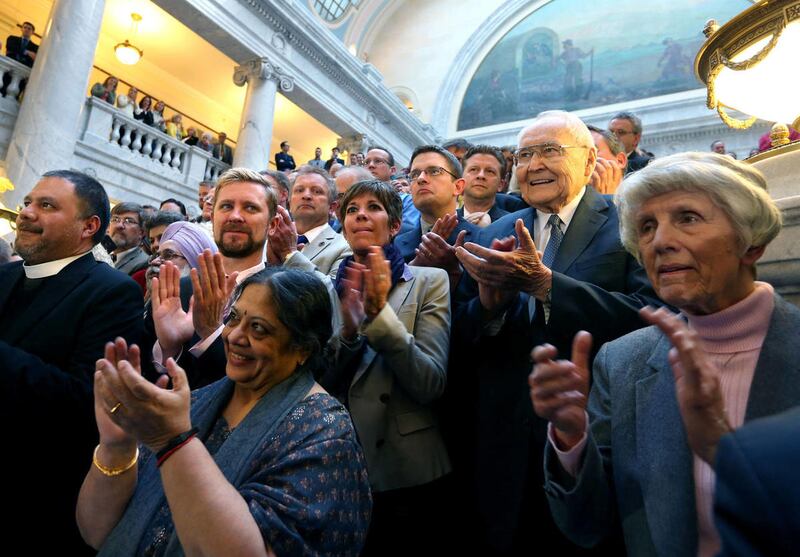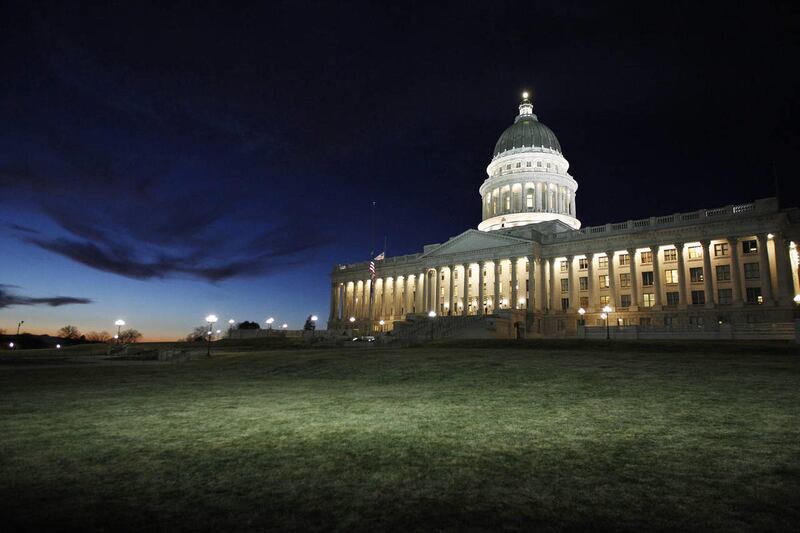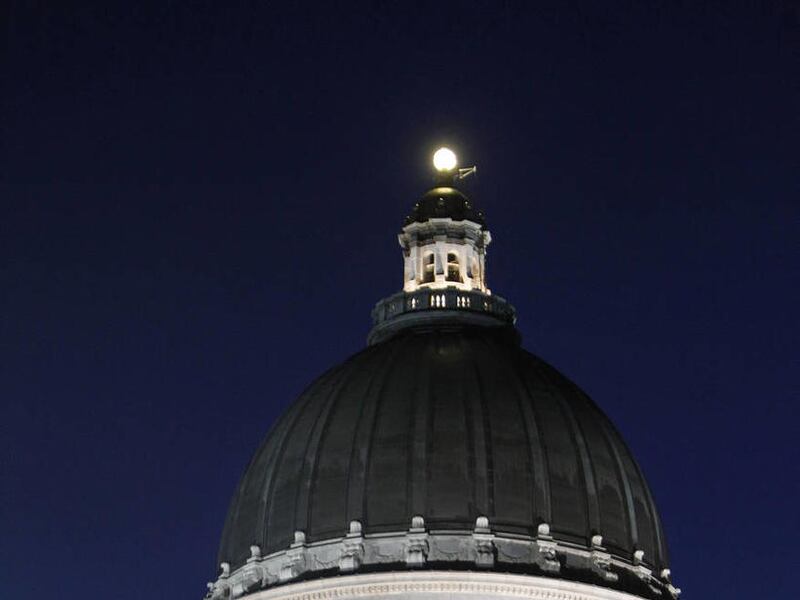SALT LAKE CITY — A historic anti-discrimination and religious rights compromise, and a monumental stalemate over Medicaid expansion brought down the curtain Thursday on the 2015 Utah Legislature.
Lawmakers also devoted a significant amount of new money to public education as part of a $13.4 billion state budget, satisfying Gov. Gary Herbert's top priority.
Despite a $739 million surplus in one-time and ongoing funds, lawmakers raised property tax for schools and increased the state's gas tax to fix crumbling roads and bridges.
Senate President Wayne Niederhauser, R-Sandy, described the 45-day session as a "huge success," noting lawmakers had a lot of big-ticket items and "addressed three-fourths of them."
House Speaker Greg Hughes, R-Draper, said this has been the session of "heavy lifts," especially actions taken to ensure anti-discrimination and religious rights, increase funding for schools and roads, and reduce prison recidivism.
But a deal on Healthy Utah, the governor's Medicaid expansion alternative, didn't materialize despite weeks of behind-the-scenes negotiations that resulted only in competing bills being passed in the House and Senate.
With hours left before the end of the session, Herbert announced he and legislative leaders had until July 31 to settle on a proposal to deal with the Medicaid expansion available under the Affordable Care Act.
The governor said lawmakers will then be brought back into a special session to consider providing coverage to low-income Utahns, including some 60,000 in a so-called coverage gap who don't qualify for federal subsidies without the expansion.
Lawmakers didn't find a Medicaid expansion miracle but say something special happened with watershed legislation that affirms religious freedoms and extends protections for LGBT Utahns from discrimination in the workplace and housing.
Rep. Brad Dee, R-Ogden, House sponsor of SB296, said people have called it momentous, historic and a miracle.
"I just say it's Utah," he said.
Several hundred people crowded around a table in the Capitol rotunda to watch Herbert and legislative leaders sign the bill into law. Elder L. Tom Perry, of the Quorum of the Twelve Apostles of The Church of Jesus Christ of Latter-day Saints, joined a throng on the marble steps behind the governor.
"One question: How cool is this?" Sen. Steve Urquhart, R-St. George, asked the cheering crowd. His attempts to pass a statewide nondiscrimination law failed the past two years.
Herbert counted the bill signing as one of several "amazing scenes" during the session. He also noted that 2,000 teachers rallied for education funding and hundreds of others lobbied for his Healthy Utah plan.
The bill adds sexual orientation and gender identity to Utah's nondiscrimination laws in housing and employment and also clarifies exemptions for religious institutions and their affiliates and provides protections for religious expression.
"We believe in fairness for all," Elder Perry told reporters as he left the Capitol after the signing.
Though lawmakers said the bill, backed by LGBT advocates, business leaders and the LDS Church, isn't perfect, they praised the spirit of cooperation and respect that led to the compromise.
"We let this unite us instead of divide us," said Senate Majority Whip Stuart Adams, R-Layton, who along with Urquhart carried the bill.
The LDS Church issued a statement Thursday saying it's pleased the Legislature passed SB296.
"It reflects the very best of collaboration and statesmanship from groups and individuals who may not always agree on all things, but who have passed landmark legislation that balances religious freedom and anti-discrimination," said spokesman Eric Hawkins. "While other states may find a different solution, we hope this fair, balanced approach shows that fairness for all is possible."
A statewide nondiscrimination law that includes LGBT Utahns in housing and employment was at least seven years in the making. Some lawmakers also have fought for religious freedom legislation for several years.
Lawmakers also passed SB297, which requires county clerks or a "willing" designee to be available to marry same-sex couples or couples who qualify for a marriage license. The bill includes broad protections for religious beliefs, exercise and conscience. It also guards against retaliation for expressing religious views outside the workplace.
Sen. Jim Dabakis, D-Salt Lake City, the state's only openly gay legislator, said he's not crazy about everything in the bill, but says it walked a "wonderful" fine line.
"All of these rights and protections go across the board," he said. "They're protecting all of us."
Herbert is still reviewing that bill and said he is "optimistic" about signing it.
"I expect these bills, SB296 particularly and SB297, will unite us and hopefully, I believe, will not divide us," he said.
A third bill on the issue, HB322, passed in the House but died in the Senate. The measure, which drew sharp criticism from the LGBT community, sought to reaffirm religious freedom spelled out in the Utah and U.S. constitutions.
Senate Majority Leader Ralph Okerlund, R-Monroe, said majority Republicans didn't want to do anything that would detract from the other two bills.
Another weighty issue came down to the last hour of the session
After wrangling over competing proposals to raise the state's gas tax for several weeks, the House and Senate appeared to settle on a compromise late Thursday.
HB362 transitions the 24.5 cents-per-gallon tax to a 12 percent per-gallon sales tax. That means the tax would fluctuate with the price of gas, but according to the bill could not exceed 40 cents or dip below 29 cents.
Utah's gas tax has not gone up since 1997.
Sen. Kevin Van Tassell, R-Vernal, said that prevents the tax from becoming a "runaway train."
The bill also includes a .25 percent local-option sales tax increase that voters would have to approve in counties. The revenue would be divided among the Utah Transit Authority, counties and cities and directed to road and transit projects.
Sen. Howard Stephenson, R-Draper, opposed the bill, saying the tax increase takes the state in the wrong direction because it "doesn't hit the users (of the road) in the pocketbook."
Also, he said people are going to wonder why the Legislature is raising taxes in a year when the state has a nearly $800 million surplus.
Sen. Al Jackson, R-Highland, said it's the right approach because it will help the state keep pace with inflation. It would help Utah deal with a projected $11.3 billon gap in transportation funding over the next 25 years.
Niederhauser said lawmakers also said they can't continue bleed money public education to pay for roads as they've done the past several years.
SB297 isn't the only controversial bill Herbert is mulling.
The governor still has to decide whether to sign a bill that allows the state to use the firing squad for executions when the drugs for lethal injection are not available.
Herbert said he would likely veto the so-called "common sense" carry bill that would allow people carry concealed guns without a permit. He vetoed a similar measure two years ago.
Email: lisa@deseretnews.com
Twitter: DNewsPolitics



















